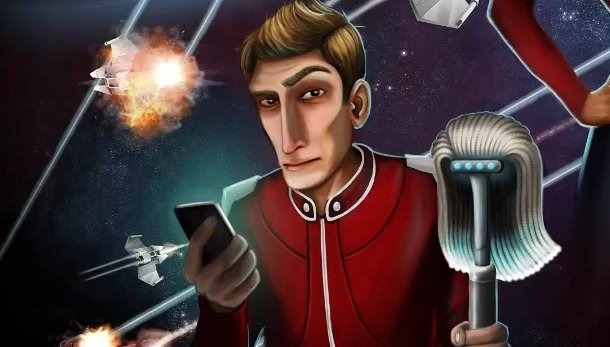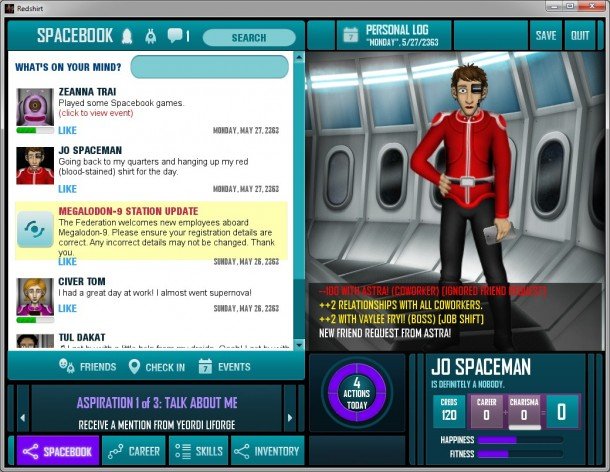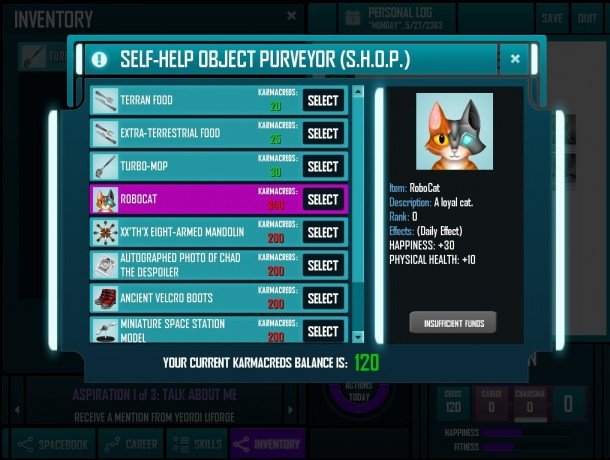Redshirt preview: a sci-fi "disempowerement fantasy" about social networking on a starship

“The ultimate job is to be the commander's assistant,” says Mitu Khandaker, the developer of Redshirt . Why not the commander? “Because this whole game is a disempowerment fantasy. If you want to play a game where you ride around driving a spaceship, there are plenty of games for that. This is a game about being a nobody.”
“The game is that you are a Red Shirt, an expendable character from science fiction, so you know you're probably going to die one day in some sort of horrible accident... The aim of the game is that you're trying to rise above that job.” Redshirt takes place entirely within the interface of a thing called 'Spacebook', an intergalactic Facebook-style social network, where essentially you suck-up to climb the career ladder. It has a very British sense of humour, as well as the essential Star Trek jokes.
"You are a Red Shirt, an expendable character from science fiction."
“I do worry that non-Brits won't get it. I'm a massive fan of Red Dwarf... I do know a lot of American fans who do get [Red Dwarf], so that gives me hope. I think they'll embrace it as a sort of weird British quirky thing,” Mitu says, grinning. “The joke of the game is the fact that you're a person that's so obsessed with the day to day social interactions with people while this big galactic war rages in the background - your main concern is getting the right number of likes on your status.”
Mitu is so extrovertly smart my toes curl when I sit next to her. A solo independent developer, she started a company called The Tiniest Shark, “which I like to pretend is my spaceship that I fly around in” she explains, and has been developing her game by herself for the last 19 months or so. Before that she was doing a PhD in game development. “I was looking at controller aesthetics and stuff, and I got to the point in my PhD where I wasn't getting to like, make stuff . I was lucky enough to pitch this idea I had for a social networking sim to Cliffski of Positech Games, who made Gratuitous Space Battles, and he offered to publish it as an indie. Which I think is a cool thing - it kind of shows how the indie scene can be sustainable.”

"There's a station load full of randomly generated NPCs each with their own behaviour and personality."
Developing the game has been difficult, not least because Mitu knows she is making a lot of assumptions about how people work. “I had so many moments of going 'Oh god how do people work?!' When you're making a social simulation game, you're obviously putting your own biases in. What factors go in to whether we're willing to accept someone's friend request? On Spacebook, if you send someone a friend request to an NPC, that's influenced by firstly 'Do you have any mutual friends?' because I think in real life people look at that. Shared interests as well: if you have a certain number of shared interests with a character then they are more likely to accept you...that's kind of the equivalent of being able to read someone's profile. When you create a game there's a station load full of randomly generated NPCs each with their own behaviour and personality, so that some people are more crabby than others.”
I ask what you have to do for an AI to delete you. “If you never talk to them, or like their statuses or never see them...they start liking you less. One of the instances where that can happen is if you have a lot of mutual friends and you invite the mutual friends to activities, but not that particular NPC, they can get jealous.”
One of the most interesting things about the entire game is that Mitu has reworked the way traditional character creation works entirely. Mitu has constrained skin colour on races such as the Rygellians, she says, as a kind of comment on tropes. “But in terms of humans, I've included the whole spectrum of human skin colours...
The biggest gaming news, reviews and hardware deals
Keep up to date with the most important stories and the best deals, as picked by the PC Gamer team.

“When, as developers, we build stuff, you kind of put your own biases go into that. I thought okay, if I'm not following conventions of character creators, and just putting binary 'male' 'female' because that's what happens, what would I actually want to put? I know that even a gender slider is problematic in lots of ways in terms of how we look at gender, and so that's not necessarily going to be the final, final version - but you know, gender is such a complicated thing, which is also why there's a private option, if you just want to go 'screw all this'!
"It's a kind of comment on how social networks almost use people as resources."
“There is a race called the Rygellians, which is a race of green/blue-skinned ladies: a comment on the usual sci-fi trope. But the joke in the game is that they are an empowered all-female race, but actually they are just horrendously objectified by everyone else. Their uniforms - they can only wear dresses - everyone else can wear like, trousers and top. But even with that race, I decided to keep the gender slider as it was, so you can be Rygellian who also identifies as male. I guess with the character creator I wanted it to be as open as possible so players can feel invested in the character they make. There's no point in me constraining it for no apparent good reason.”
I tell her it's kind of a relief to find a game that is interested in NPCs being individual people, but she corrects me: “It's a kind of comment on how social networks almost use people as resources.” And she's right - the entire time I played through Redshirt, I felt like I was clicking 'like' just to make sure someone didn't unfriend me, or I was inviting someone to a party because I wanted them to invite me to their parties.
Redshirt is due out late July 2013. Find out more on the Redshirt site .

